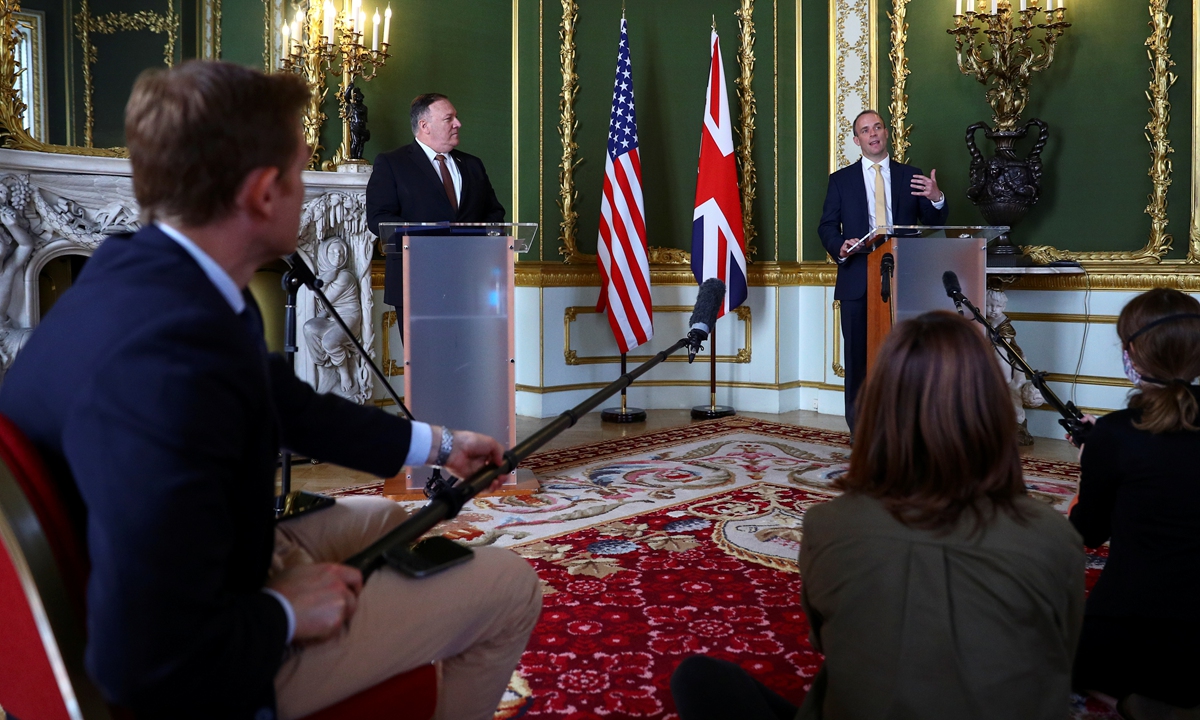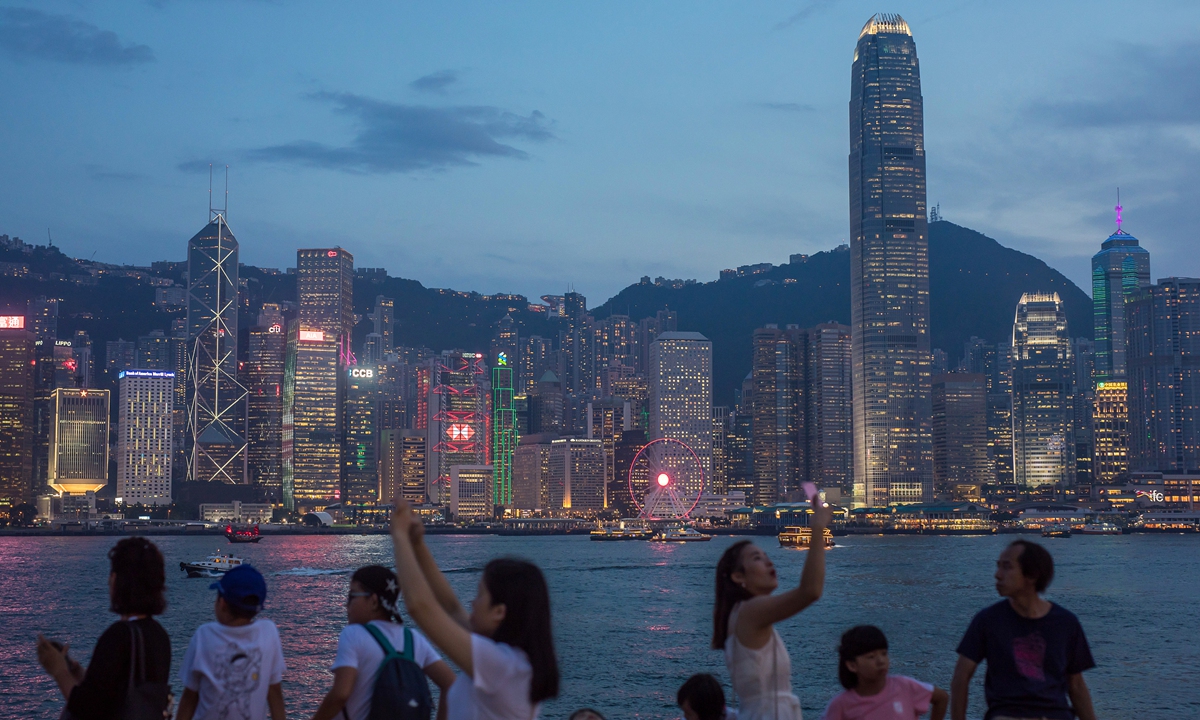Beijing vows to strike back forcefully in response to London’s wrong deeds: Chinese FM
London trades harsh stance on Beijing for deals with US: experts

Britain’s Foreign Secretary Dominic Raab (right) speaks during a meeting with his US counterpart Mike Pompeo, at Lancaster House in London on Tuesday. Photo: AFP
US Secretary of State Mike Pompeo held talks with British officials and some Hong Kong secessionists fleeing to the UK on Tuesday during his visit to London amid growing US-China tensions. Abandoning an independent foreign policy and yielding to the pressure of Washington, the Boris government has taken a harsh stance on Hong Kong, Huawei and other China-related matters. The policies will eventually backfire and London's policies won't be followed by the rest of Europe, observers said.
Pompeo met with British Prime Minister Boris Johnson and other officials on Tuesday, and was also scheduled to hold talks with the former governor of the Hong Kong Special Administrative Region (HKSAR) Chris Patten and Hong Kong secessionist leader Nathan Law Kwun Chung. Such arrangements laid bare the purpose of his brief visit: take on China by utilizing all necessary anti-Beijing forces, according to observers.
As Washington now pushes hard to form an anti-China alliance in Europe, the UK has become the first one to "dance to the tune" of the Americans by banning Huawei in its 5G construction, suspending an extradition treaty with the HKSAR and harshly accusing Beijing of "gross" human rights abuses in Northwest China's Xinjiang Uygur Autonomous Region.
Pompeo said he held constructive and candid talks on 5G security, a potential free trade deal, and other matters during his meeting with Johnson in London on Tuesday, according to media reports.
Before meeting with the US Secretary of State, the British government announced on Monday to suspend its extradition treaty with the HKSAR and blocked arms sales to the Chinese city. The announcement is considered as a "welcoming gift" for showing Britain's willingness to "stand with the US," as some Chinese observers said.
Grave consequences
The suspension of the extradition treaty between the UK and Hong Kong will encourage more secessionists like Law who were behind months-long riots in Hong Kong, to flee to the UK and will make the country a heaven for transnational crime, a base for terrorism and seriously affect the UK's public security, Kennedy Wong Ying-ho, a solicitor at the Supreme Court of Hong Kong, told the Global Times on Tuesday.
It will severely shake the UK's role of a global financial hub and undermine its influence in Europe, Wong said.
Nathan Law is one of the major agitators behind violent anti-government protests in the HKSAR in 2019, which escalated to a citywide riots that dragged the once-prosperous city into chaos. Shortly after the national security law for Hong Kong was implemented, with the strong deterrent effects on secessionists and terrorists, Law fled to London.
Pompeo is also scheduled to meet with other anti-China figures, revealing that the Five Eyes alliance, led by the US, is using them to serve their anti-China interests, Wong said.
Ending the extradition agreement with the HKSAR won't have a significant impact on law enforcement in the city nor on the mainland, but countries like the UK that took such reckless actions may face risks, as those fugitives who violated the law in Hong Kong could flee to the UK, bringing potential security risks to the country, according to observers.
The Chinese Foreign Ministry, the Chinese Embassy in the UK and the HKSAR government all voiced firm opposition on Tuesday to the UK's latest move on Hong Kong - blatant interference in the internal affairs of China. "In the face of wrongdoing on the UK side, China will strike back forcefully," Wang Wenbin, spokesperson of the Chinese FM, told a routine press conference.
He also urged the UK to abandon the illusion of continuing its colonial influence in the HKSAR and immediately correct its mistakes to avoid further damage to China-UK ties.
The Chinese embassy also warned the UK not to go further down the wrong path, otherwise it will backfire, a spokesperson from the Chinese embassy said in a statement sent to the Global Times on Tuesday.
The UK's suspension of the extradition treaty with Hong Kong also drew ire from Chinese netizens. It was listed on Sina Weibo's hot topic list on Tuesday with over 200 million views.
Many Chinese netizens slammed the UK for being "duped" by the US and suggested to the UK that they should receive all of the Hong Kong rioters and let them cause chaos in the country.
China's response
While Chinese Ambassador to the UK Liu Xiaoming warned that the UK would bear the consequences of damaging bilateral relations, some observers are wondering what will the possible Chinese response and countermeasures in order to defend Beijing's legitimate rights. If the British government imposes sanctions on any individual in China, the Chinese side will make a resolute response, Liu said in a tweet on Tuesday.
China will not confront the UK and immediately reciprocate sanctions on it like it did on the US, as there is still much more leeway for improving China-UK relations, according to observers.
"China will fully assess the impact of the UK's Huawei ban in regards to coming up with countermeasures," Cui Hongjian, director of the Department of European Studies, China Institute of International Studies, told the Global Times.
Though China does not want countermeasures that may push the UK too far away from China, in response to its wrong deeds, there are some options to hit 10 Downing Street where it could cause the most pain, observers said.
"London is currently the world's biggest center for trading renminbi outside China, but it is no longer the financial center for Europe after Brexit, thus China could consider moving the renminbi trading center from London to Frankfurt," Wong said, noting that when the city becomes the shelter of fleeing fugitives, it will also become less attractive to investors.
Influence on Europe
Besides the London trip, Pompeo will head to Denmark on Wednesday to hold talks with Prime Minister Mette Frederiksen and other officials, with topics regarding China also on the agenda.
Pompeo's UK and Denmark visits this week are aimed at ripping a hole in Europe on the position of Huawei and provoking Europe's relations with China, so that all European countries would follow the US and the UK in excluding Huawei from their markets - a symbolic move in taking a hostile stance towards China, but "this is unlikely to happen," Cui said.
"The UK's influence in Europe has dramatically declined after Brexit, and countries like Germany and France are more important countries in affecting Europe's attitudes towards Huawei and China," Cui said.
German Chancellor Angela Merkel has been reluctant to criticize China on its COVID-19 response and refrained from criticizing Beijing on the national security law for Hong Kong, which has been regarded as a "rational view" that incorporates strategic thinking into the future of China and Europe ties.
From the US side, the US has more means at its disposal to put pressure on the UK, the only Five Eyes member in Europe, but it has far less means to press other European countries on their stance on Huawei and China, Cui said.
Pompeo chose Denmark due to its relatively unfriendly attitude towards Huawei. If not, why not visit countries like Hungary which has opened up its 5G market, Cui said, noting that Denmark will at most follow the US verbally.
Even for the UK, it's trying to limit the impact of its Huawei ban on China-UK relations within a certain scale to avoid fully damaging the relationship with China.
All those gestures that the UK has made, no matter whether on Hong Kong or Huawei, was out of the need to exchange for what it needed on the trade deal with the US during Pompeo's visit, and if it did not satisfy the deal, it would lean towards China again, Cui added.


